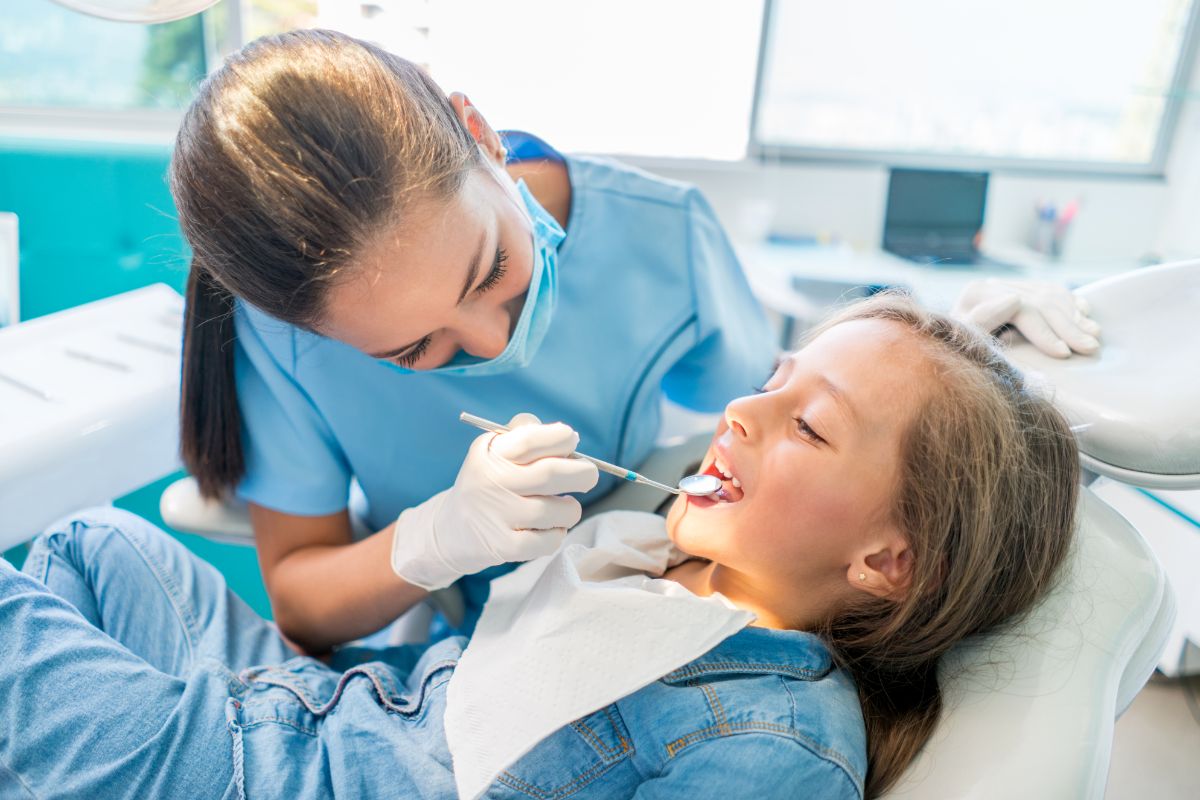Did you know that good dental care begins before your baby gets their first tooth? Although you can’t see them, a baby’s teeth begin forming in the second trimester of pregnancy. At birth, some permanent teeth are already fully developed in the jaw! The earlier you begin preventive dental care for your child, the less likely they are to have problems in the future.
The team here at Sycamore Orthodontics & Pediatric Dentistry is proud to partner with parents in our community to give children the best chance at a lifetime of happy smiles! Let’s take a closer look at what preventive dentistry entails and how it can benefit your child’s oral health. Keep reading below to learn more!
Preventive oral hygiene and instruction
Helping your child avoid tooth decay can often be accomplished by simply adhering to a good dental hygiene routine. A sample routine might look like:
- brushing at least twice a day for two minutes each time
- flossing every night before bed
- regular dental checkups
- a healthy diet with minimal sugar
- fluoride treatments
If your child is under three years old, you should help them clean their teeth with water and a soft-bristled toothbrush. We encourage children ages three and up to brush their own teeth with parental supervision whenever possible, as this sets them up for a lifetime of healthy dental habits! Younger children can use a toothbrush with soft bristles and a pea-sized amount of fluoride toothpaste. Have them spit any excess toothpaste out rather than swallowing it.
Flossing should always follow brushing. If your child has difficulty guiding regular dental floss successfully, dental floss picks are available that are easier for small hands to handle. They even come in a range of bright colors and various flavors to make oral care a fun adventure!
First dental visit
Dental visits should begin with the appearance of your child’s first tooth, and preferably no later than their first birthday. These visits allow us to monitor their development and treat any potential dental problems. They also give children the chance to become familiar with our office and team members.
Your child’s first dental visit will usually be brief and involve little or no treatment. After the appropriate medical and health forms have been completed, a dental and medical history will be taken. A comprehensive examination will follow.
During this examination, Dr. Barysenka will check your child’s teeth for decay, examine their bite, and look for any potential problems with the gums, jaw, or oral tissues. She will then sit down with you and go over a range of important topics, including:
- good oral hygiene practices for healthy teeth and cavity prevention
- fluoride needs
- oral habits, such as thumb sucking, tongue thrusting, and lip sucking
- developmental milestones and potential issues
- teething
- proper nutrition
- the scheduling of dental checkups
Before this initial visit concludes, we will attempt to clean the teeth as much as the child permits and apply a fluoride varnish.

Regular checkups
As your child grows, you should plan on scheduling dental checkups about every six months. At each of these appointments, we will complete an oral examination, clean your child’s teeth thoroughly, and apply fluoride. Regular visits allow us to build a rapport with our young patients and reiterate the importance of maintaining an excellent oral hygiene routine at home! Routine checkups and good dental hygiene can help prevent cavities and the need for dental work in the future.
Professional cleanings
Teeth cleanings and professional polishing treatment are part of every child’s preventive program and should be done every six months. Dr. Sarah Barysenka uses a special paste to polish teeth and remove any plaque and visible staining. Additional scaling is sometimes needed to remove calculus, also known as tartar, and build-up that has accumulated over time. Your child’s cleaning will always include flossing in between the teeth and will frequently end with a fluoride application to protect the tooth structure from cavities.
Fluoride use
We use fluoride in young children to help their developing teeth grow strong. It can also help prevent tooth decay in older children. Regular use of fluoride hardens the tooth enamel, making it harder for acid to penetrate. This has been shown to dramatically decrease the risk for cavities.
Fluoride in a family’s drinking water is the best and easiest way to get it. Most areas require their tap water to be fluoridated, but not all do. For families whose water supply is not fluoridated or whose children routinely drink bottled water, fluoride supplements may be needed. Dr. Barysenka will evaluate the fluoride level of your child’s primary source of water and determine any resulting fluoride needs.
Toothpaste and rinses that contain fluoride are not sufficient to fully protect a child’s teeth. Always check with Dr. Barysenka before supplementing fluoride, however, since overuse can cause discoloration of a child’s teeth.
Sealants
A sealant is a composite material that is applied to the chewing surfaces of the back teeth, where a majority of cavities in children can form. This sealant acts as a barrier to food, plaque, and acid, helping to protect the areas of the teeth that are prone to decay. Sealants can be an excellent tool for preventive care, and we recommend them often for permanent teeth that are free from decay. It is important to note, however, that cavities between the teeth will not be protected by sealants.
Dental x-rays
The American Academy of Pediatric Dentistry (AAPD) recommends young children have bitewing x-rays taken every 6 months to 3 years, depending on their risk for developing cavities. Our practice will generally take x-rays once per year, beginning when a child’s posterior teeth have contact with one another. We will then introduce a panoramic x-ray once all eight permanent incisors are in. This will often be updated again when we evaluate the child’s wisdom teeth.
If at any point these x-rays show that your child may be a candidate for orthodontic treatment, Dr. Peter Berysenka is able to provide this service under the same roof. This eliminates the need to travel to a second office for treatment!

Prevent decay and preserve your child’s smile with Sycamore Orthodontics & Pediatric Dentistry
Here at Sycamore Orthodontics & Pediatric Dentistry, Dr. Barysenka and our expert team are trained to provide the highest level of comfort and care for every child! We work with parents like you to provide education about the basics of oral health care for children, normal dental development, and the many ways you can help your child achieve a healthy smile that is beautiful and fully functional.
Dr. Barysenka has years of experience caring for children. Her relaxed and calm approach will put your child at ease almost instantly! We want to make sure visiting the dentist is a good experience for your child, so they’ll look forward to their dental appointments as they get older. If your child is ready for their first visit or a routine checkup, get in touch today and we’ll be happy to schedule it for you!
